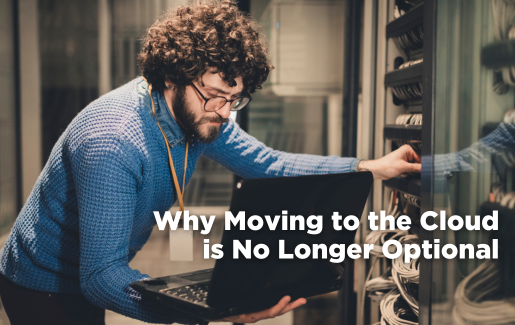 Emerging technologies always cause a bit of buzz. Everyone wants the next best thing and companies clamber to be the name that innovates and stands out from the crowd using their technology as the banner that marks them as different and better. But being the first to innovate sometimes just means you’ve given in to what’s trending over utility and you eventually become faced with the consequences of a mediocre technology solution—all in the name of hype. This is decidedly not what businesses can expect with the cloud.
Emerging technologies always cause a bit of buzz. Everyone wants the next best thing and companies clamber to be the name that innovates and stands out from the crowd using their technology as the banner that marks them as different and better. But being the first to innovate sometimes just means you’ve given in to what’s trending over utility and you eventually become faced with the consequences of a mediocre technology solution—all in the name of hype. This is decidedly not what businesses can expect with the cloud.Cloud technology is no longer emerging. It’s validated across every vertical and business model and has proven its worth time and time again. In fact, Gartner reports that 85% of enterprises will be operating as cloud first by 2025. Why is the cloud now indispensable? Here are eight reasons the cloud is no longer optional.
1. The Cloud Supports Remote Teams
The days of on-premises server farms and connected devices are a thing of the past. If the pandemic taught us anything, it’s that we truly can work from anywhere as long as we have access to the right technology. Now that more teams have gone down the decentralized path, cloud technology is needed to connect and secure remote working environments. In 2020 alone, 61% of businesses migrated to the cloud to support remote workloads. With many businesses keeping a remote or hybrid working environment, cloud technology is more essential than ever.
2. The Cloud Lets Us Manage Huge Amounts of Data
Companies process more data than ever. Reports show that the average person generates 1.7 MB of data per second, with a whopping world total of 94ZB as of 2022. Of that, 90% has been created in the last two years. We have lots of data and it’s only growing. Cloud databases are the only viable solution for managing and storing the vast amounts of data that businesses need to remain competitive and compliant.
3. The Cloud Improves Security
Cyber threats continue to grow. One Forbes article describes the growth as exponential, with a predicted financial impact of $8 trillion in 2023. Needless to say, cyber threats are a pervasive issue. Cloud vendors help to protect against threats by encrypting data, enhancing governance and policies, and adhering to industry compliance standards. You will also see better redundancy to reduce the chances of data loss in the event of a breach or system outage.
4. The Cloud Drives Down Costs
We’ve seen some of the highest inflation rates over the last several years. In 2022, inflation rates reached the highest level in 20 years, leading business leaders to tighten the belt. Utilizing the cloud helps to drive down business costs because MSPs undertake the costs associated with hardware purchase and maintenance, both from an equipment and personnel standpoint. Google reports that 41.4% of business leaders plan to increase their use of cloud-based services to mitigate the current economy. In fact, 94% of startups report reduced upfront costs, with companies saving approximately 20% annually on infrastructure with cloud technology.
5. The Cloud Improves Speed and Agility
The cloud makes it possible to do so much more, much more quickly. From reducing time to market to enhancing scalability at a moment’s notice, the cloud allows businesses to make quick work of nearly any functionality. A recent Hackett study reports that companies burdened by high levels of complexity are less able to quickly pivot to new operating or business models, mitigate impacts of economic upheaval or take full advantage of fleeting opportunities. Companies using the cloud reduce complexity and therefore enhance their ability to quickly take advantage of new opportunities. Additionally, cloud databases are far easier to implement and decommission, which facilitates easier data management.
6. The Cloud Is Needed to Embrace AI Technology
Google tells us that AI and machine learning are top requirements for driving multi-cloud deployments due to the large amount of computing power and storage needed to power these innovative technologies. With more businesses planning to use AI as part of their strategy in 2023, cloud technology will be essential to implement AI capabilities.
7. The Cloud Reduces Downtime
Most businesses are promising an extremely high uptime rate, making it more difficult than ever to rely on anything other than cloud technology. The redundancies created by leveraging the cloud make downtime a thing of the past. Most cloud providers guarantee a nearly perfect uptime of 99.99%. With the average cost of downtime falling anywhere between $2,300 and $9,000 per minute, most businesses want to utilize technology that limits this kind of impact to revenue.
8. Everyone Is Using the Cloud
Businesses are achieving customer service standards and speeds unlike anything that’s been seen before, with an omnichannel experience that is only achievable by leveraging cloud technologies. According to Zippia, 94% of enterprise businesses are using the cloud. The cloud is leveling the playing field for many businesses because smaller institutions can leverage the same technology and options as leading companies.
CompTIA is here to support you throughout your IT career. Get free resources, career advice, and special offers on CompTIA training and certifications!

